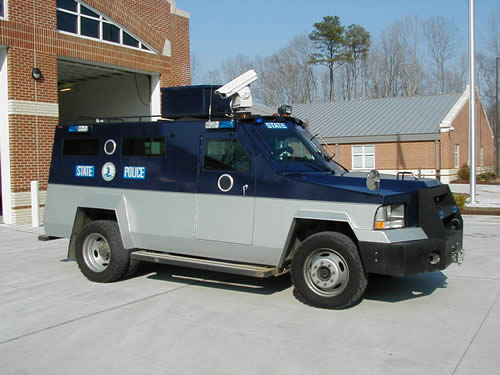Virginia State Police Help With Budget Crunch
A federally funded ticketing blitz in the state of Virginia landed a total of 6996 traffic tickets this weekend. The blitz, dubbed “Operation Air, Land & Speed” coincided with frantic efforts by state officials to close a$2.2 billion budget deficit. Supervisors ordered state troopers to saturate Interstates 81 and 95 to issue as many tickets as humanly possible over the space of two days.
Officers had no trouble delivering the requested number of speeding tickets with a total of 3536 ordinary speeding citations written. In addition, another 717 “reckless driving” tickets were filed, although these most often are simple speeding tickets that happen to carry a fine of up to $2500. Driving as little as 10 to 15 MPH over the limit can qualify for this enhanced punishment. On the other end of the scale, some 310 tickets were handed to drivers who either forgot to wear their seatbelts or made a choice not to do so.
Activists with the National Motorists Association pointed out that enforcement efforts may have concentrated on areas where speed limits are expected to rise to 70 MPH following Governor Bob McDonnell’s signature on legislation raising the state’s maximum speed limit ( view law). This would mean a significant number of tickets were issued for conduct that will be perfectly legal in a matter of months. The group also indicated that state police tactics may run afoul of state law.
“All officers making arrests incident to the enforcement of this title shall be paid fixed salaries for their services and shall have no interest in, nor be permitted by law to accept the benefit of, any fine or fee resulting from the arrest or conviction of an offender against any provision of this title,” Virginia Code Section 46.2-102 states.
Under the federal grant application process, state officials explained that they would pay officers overtime — at least one-and-a-half times their normal salary — to participate. This special reward for ticketing operation participants appears to violate the spirit of state law.
Since 2006, a total of twenty-three ticketing blitzes have taken place, generating 120,977 traffic tickets.
[courtesy: Thenewspaper.com]
More by The Newspaper
Latest Car Reviews
Read moreLatest Product Reviews
Read moreRecent Comments
- Alan My view is there are good vehicles from most manufacturers that are worth looking at second hand.I can tell you I don't recommend anything from the Chrysler/Jeep/Fiat/etc gene pool. Toyotas are overly expensive second hand for what they offer, but they seem to be reliable enough.I have a friend who swears by secondhand Subarus and so far he seems to not have had too many issue.As Lou stated many utes, pickups and real SUVs (4x4) seem quite good.
- 28-Cars-Later So is there some kind of undiagnosed disease where every rando thinks their POS is actually valuable?83K miles Ok.new valve cover gasket.Eh, it happens with age. spark plugsOkay, we probably had to be kewl and put in aftermarket iridium plugs, because EVO.new catalytic converterUh, yeah that's bad at 80Kish. Auto tranny failing. From the ad: the SST fails in one of the following ways:Clutch slip has turned into; multiple codes being thrown, shifting a gear or 2 in manual mode (2-3 or 2-4), and limp mode.Codes include: P2733 P2809 P183D P1871Ok that's really bad. So between this and the cat it suggests to me someone jacked up the car real good hooning it, because EVO, and since its not a Toyota it doesn't respond well to hard abuse over time.$20,000, what? Pesos? Zimbabwe Dollars?Try $2,000 USD pal. You're fracked dude, park it in da hood and leave the keys in it.BONUS: Comment in the ad: GLWS but I highly doubt you get any action on this car what so ever at that price with the SST on its way out. That trans can be $10k + to repair.
- 28-Cars-Later Actually Honda seems to have a brilliant mid to long term strategy which I can sum up in one word: tariffs.-BEV sales wane in the US, however they will sell in Europe (and sales will probably increase in Canada depending on how their government proceeds). -The EU Politburo and Canada concluded a trade treaty in 2017, and as of 2024 99% of all tariffs have been eliminated.-Trump in 2018 threatened a 25% tariff on European imported cars in the US and such rhetoric would likely come again should there be an actual election. -By building in Canada, product can still be sold in the US tariff free though USMCA/NAFTA II but it should allow Honda tariff free access to European markets.-However if the product were built in Marysville it could end up subject to tit-for-tat tariff depending on which junta is running the US in 2025. -Profitability on BEV has already been a variable to put it mildly, but to take on a 25% tariff to all of your product effectively shuts you out of that market.
- Lou_BC Actuality a very reasonable question.
- Lou_BC Peak rocket esthetic in those taillights (last photo)


































Comments
Join the conversation
As you may know, Virginia is the only state that bans the use and sale of radar detectors. There is no evidence that the radar detector ban increases highway safety. Our nation’s fatality rates have fallen consistently for almost two decades. Virginia’s fatality rate has also fallen, but not any more dramatically than it has nationwide. Research has even shown that radar detector owners have a lower accident rate than motorists who do not own a detector. Maintaining the ban is not in the best interest of Virginians or visitors to the state. I know and know of people that will not drive in Virginia due to this ban. Unjust enforcement practices are not unheard of, and radar detectors can keep safe motorists from being exploited by abusive speed traps. Likewise, the ban has a negative impact on Virginia’s business community. Electronic distributors lose business to neighboring states and Virginia misses out on valuable sales tax revenue. Radar detector bans do not work. Research and experience show that radar detector bans do not result in lower accident rates, improved speed-limit compliance or reduce auto insurance expenditures. • The Virginia radar detector ban is difficult and expensive to enforce. The Virginia ban diverts precious law enforcement resources from more important duties and this ban may be ILLEGAL. • Radar detectors are legal in the rest of the nation, in all 49 other states. In fact, the first state to test a radar detector ban, Connecticut, repealed the law – it ruled the law was ineffective and unfair. It is time for our Virginia to join the rest of the nation. • It has never been shown that radar detectors cause accidents or even encourage motorists to drive faster than they would otherwise. The Yankelovich – Clancy – Shulman Radar Detector Study conducted in 1987, showed that radar detector users drove an average of 34% further between accidents (233,933 miles versus 174,554 miles) than non radar detector users. The study also showed that they have much higher seat belt use compliance. If drivers with radar detectors have fewer accidents, it follows that they have reduced insurance costs – it is counterproductive to ban radar detectors. • In a similar study performed in Great Britain by MORI in 2001 the summary reports that "Users (of radar detectors) appear to travel 50% further between accidents than non-users. In this survey the users interviewed traveling on average 217,353 miles between accidents compared to 143,401 miles between accidents of those non-users randomly drawn from the general public." The MORI study also reported "Three quarters agree, perhaps unsurprisingly, that since purchasing a radar detector they have become more conscious about keeping to the speed limit..." and "Three in five detector users claim to have become a safer driver since purchasing a detector." • Modern radar detectors play a significant role in preventing accidents and laying the technology foundation for the Safety Warning System® (SWS). Radar detectors with SWS alert motorists to oncoming emergency vehicles, potential road hazards, and unusual traffic conditions. There are more than 10 million radar detectors with SWS in use nationwide. The federal government has earmarked $2.1 million for further study of the SWS over a three-year period of time. The U.S. Department of Transportation is administering grants to state and local governments to purchase the SWS system and study its effectiveness (for example, in the form of SWS transmitters for school buses and emergency vehicles). The drivers of Virginia deserve the right to the important safety benefits that SWS delivers. Please sign this petition and help to repeal this ban and give drivers in Virginia the freedom to know if they are under surveillance and to use their property legally: www.thepetitionsite.com/1/repeal-the-virginia-radar-detector-ban Tell Friends and Family about this.
I just learned to set the cruise at the speed limit and stick to the right lane. Now you ALL could appeal your cases to circuit court and that may cause a backup in the system. car insurance quotes